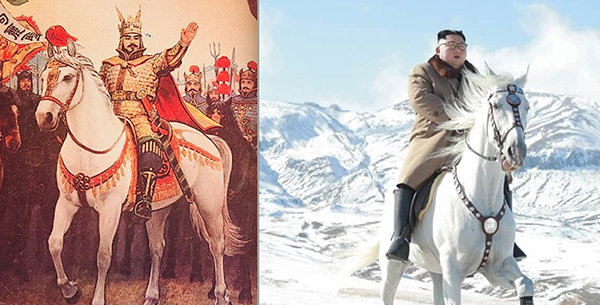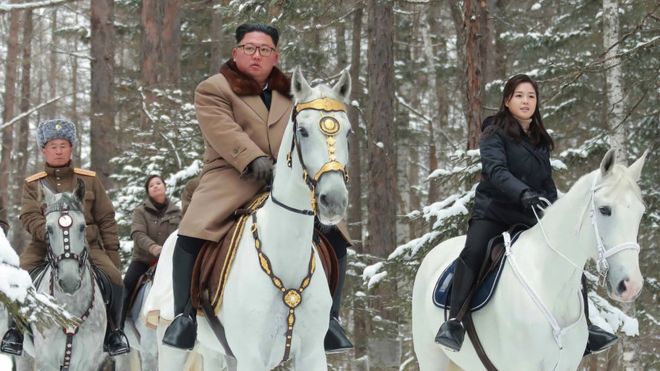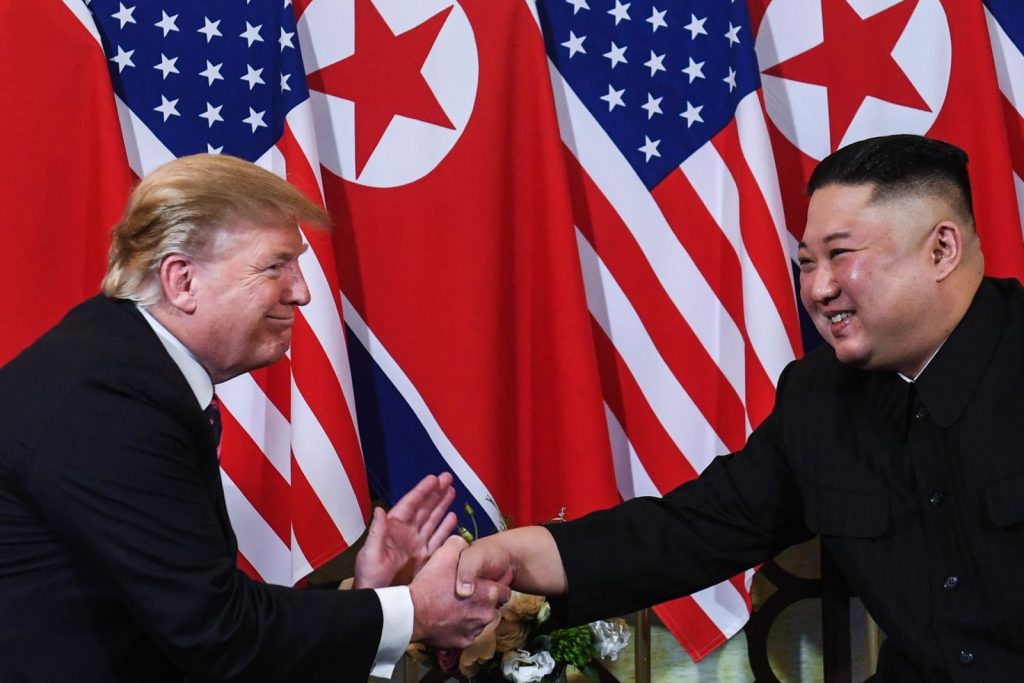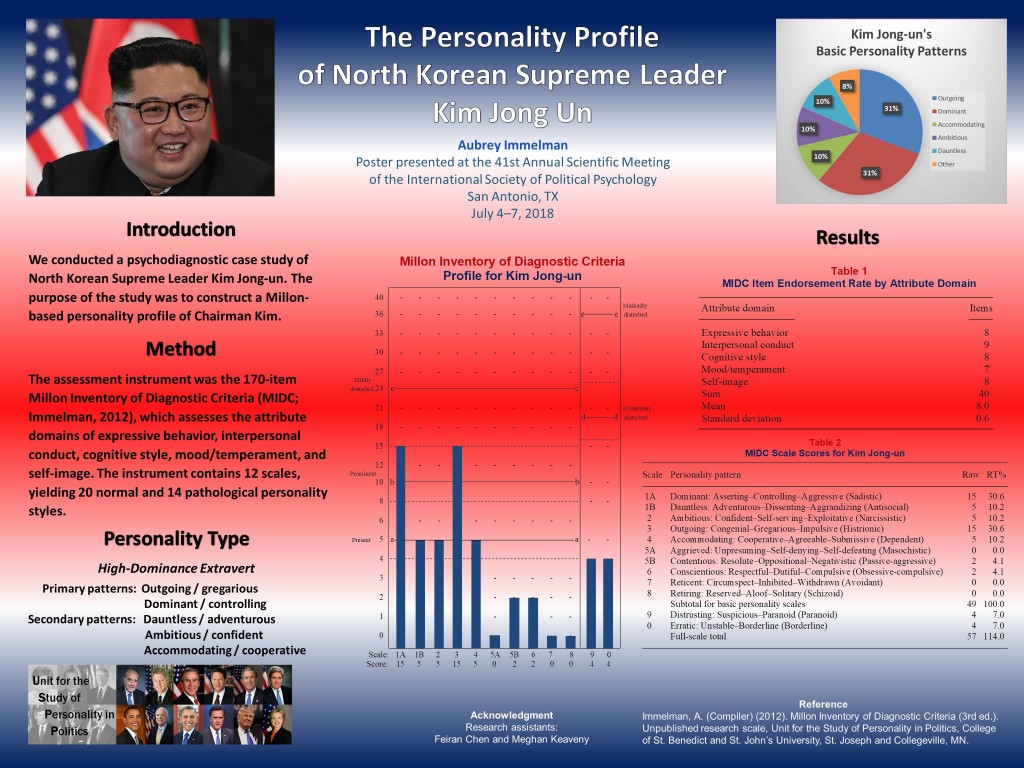Featured Posts

- Index of Psychological Studies of Presidents and Other Leaders Conducted at the Unit for the Study of Personality in Politics
- The Personality Profile of U.S. Supreme Court Associate Justice Brett Kavanaugh
- The Leadership Style of North Korean Leader Kim Jong-un
- North Korea Threat Assessment: The Psychological Profile of Kim Jong-un
- Russia Threat Assessment: Psychological Profile of Vladimir Putin
- The Personality Profile of 2016 Republican Presidential Candidate Donald Trump
- Donald Trump's Narcissism Is Not the Main Issue
- New Website on the Psychology of Politics
- Unit for the Study of Personality in Politics --- 'Media Tipsheet'
categories

- Afghanistan (228)
- Al Gore (2)
- Amy Klobuchar (4)
- Ayman al-Zawahiri (7)
- Barack Obama (60)
- Ben Carson (2)
- Bernie Sanders (7)
- Beto O'Rourke (3)
- Bill Clinton (4)
- Bob Dole (2)
- Campaign log (109)
- Chris Christie (2)
- Chuck Hagel (7)
- Criminal profiles (8)
- Dick Cheney (11)
- Domestic resistance movements (21)
- Donald Trump (31)
- Economy (33)
- Elizabeth Warren (4)
- Environment (24)
- George H. W. Bush (1)
- George W. Bush (21)
- Hillary Clinton (9)
- Immigration (39)
- Iran (43)
- Iraq (258)
- Jeb Bush (3)
- Joe Biden (13)
- John Edwards (2)
- John Kasich (2)
- John Kerry (1)
- John McCain (7)
- Kamala Harris (5)
- Kim Jong-il (3)
- Kim Jong-un (11)
- Law enforcement (25)
- Libya (18)
- Mahmoud Ahmadinejad (6)
- Marco Rubio (2)
- Michael Bloomberg (1)
- Michele Bachmann (173)
- Mike Pence (3)
- Military casualties (234)
- Missing person cases (37)
- Mitt Romney (13)
- Muqtada al-Sadr (10)
- Muslim Brotherhood (6)
- National security (16)
- Nelson Mandela (4)
- News (5)
- North Korea (36)
- Osama bin Laden (19)
- Pakistan (49)
- Personal log (25)
- Pete Buttigieg (4)
- Presidential candidates (19)
- Religious persecution (11)
- Rick Perry (3)
- Rick Santorum (2)
- Robert Mugabe (2)
- Rudy Giuliani (4)
- Russia (7)
- Sarah Palin (7)
- Scott Walker (2)
- Somalia (20)
- Supreme Court (4)
- Syria (5)
- Ted Cruz (4)
- Terrorism (65)
- Tim Pawlenty (8)
- Tom Horner (14)
- Tributes (40)
- Uncategorized (50)
- Vladimir Putin (4)
- Xi Jinping (2)
- Yemen (24)
Links

archives

- November 2021
- January 2021
- November 2020
- October 2020
- September 2020
- August 2020
- July 2020
- April 2020
- March 2020
- February 2020
- January 2020
- December 2019
- October 2019
- July 2019
- May 2019
- April 2019
- March 2019
- February 2019
- January 2019
- December 2018
- September 2018
- August 2018
- July 2018
- June 2018
- April 2018
- March 2018
- February 2018
- January 2018
- August 2017
- July 2017
- June 2017
- May 2017
- April 2017
- February 2017
- January 2017
- December 2016
- November 2016
- October 2016
- September 2016
- August 2016
- July 2016
- June 2016
- May 2016
- April 2016
- March 2016
- February 2016
- January 2016
- December 2015
- November 2015
- October 2015
- September 2015
- August 2015
- July 2015
- June 2015
- May 2015
- April 2015
- March 2015
- February 2015
- January 2015
- December 2014
- November 2014
- October 2014
- September 2014
- August 2014
- July 2014
- June 2014
- May 2014
- April 2014
- March 2014
- February 2014
- January 2014
- December 2013
- November 2013
- October 2013
- September 2013
- August 2013
- July 2013
- June 2013
- May 2013
- April 2013
- March 2013
- February 2013
- January 2013
- December 2012
- November 2012
- October 2012
- September 2012
- August 2012
- July 2012
- June 2012
- May 2012
- April 2012
- March 2012
- February 2012
- January 2012
- December 2011
- November 2011
- October 2011
- September 2011
- August 2011
- July 2011
- June 2011
- May 2011
- April 2011
- March 2011
- February 2011
- January 2011
- December 2010
- November 2010
- October 2010
- September 2010
- August 2010
- July 2010
- June 2010
- May 2010
- April 2010
- March 2010
- February 2010
- January 2010
- December 2009
- November 2009
- October 2009
- September 2009
- August 2009
- July 2009
- June 2009
- May 2009
- April 2009
- March 2009
- February 2009
- January 2009
- December 2008
- November 2008
- October 2008
- September 2008
- August 2008
- July 2008
meta

On December 14 the New York Times reported:
A second test [at the Sohae Satellite Launching Station] of what appeared to be an advanced missile engine, part of what North Korea said on Saturday was part of a “reliable strategic nuclear deterrent,†left little doubt that the country is moving quickly toward resuming the program that led to a crisis with Washington two years ago. … It was the second such test in a week, and came after weeks of increasingly vocal attempts to press the United States into further talks and new concessions. … American analysts and intelligence experts said they believe the ground test … was intended as a signal that the country could soon resume testing of an intercontinental ballistic missile.
Analysts have speculated an ICBM test might occur after the end of December, a deadline Kim Jong-un imposed for the U.S. to resume negotiations and provide sanctions relief.
In its report, the New York Times quotes Pak Jong-chon, chief of the general staff of the North Korean People’s Army, as saying: “We should be ready to cope with political and military provocations of the hostile forces, and be familiar with both dialogue and confrontation†and that the U.S. and its allies would “spend the year-end in peace only when they hold off any words and deeds rattling us†— signaling that amid stalled diplomacy “the voice of North Korea’s hard-line military was rising,†according to Cheong Seong-chang, vice president of research planning at South Korea’s Sejong Institute.
In conjunction with the North Korean foreign ministry’s veiled threat in early December that North Korea was preparing a surprise “Christmas gift” for the United States, the latest rhetoric emanating from the DPRK sounds ominous.

Left: Image of King Tongmyong from a North Korean book. Right: Image of Kim Jong-un, courtesy of KCNA. (Photo composite by Jean Lee / The Wilson Center)
Analysis: How should the U.S. respond?
- In planning its response, the U.S. should exercise caution in ascertaining the personal policy preferences of Kim Jong-un and distinguishing between that and the intent of hardliners in the DPRK military establishment.
- To the extent that Kim is losing ground in his grip on power vis-à -vis the top military leadership, the U.S. could strengthen Kim’s hand by giving due consideration to the resumption of personal diplomacy between the two nations’ leaders as a complement to the continuation of working-level talks.
- It would be prudent to delay any significant response or intervention until after evaluating the tone, and learning more about the details, of Kim’s policy options in his annual New Year’s Day speech.
- In the context of the central role of personal diplomacy in the US-DPRK nuclear negotiations, consider that with the specter of impeachment and the uncertainty of Donald Trump’s reelection as president, Kim might be reluctant to strike a deal at the present juncture, preferring to adopt a wait-and-see attitude; thus, it would be prudent to exercise patience and avoid any abrupt policy reversals.
—————————————————————————
One-month follow-up — January 31, 2020
The Many Faces of Chairman Kim Jong Un

Kim Jong-un and wife Ri Sol-ju ride a white horse on Mt. Paektu (Photo: KCNA)
Commentary by Kenneth B. Dekleva, M.D.
![]()
January 30, 2020
Excerpts
At the recent December 2019 plenum, Chairman Kim, rather than giving his traditional New Year’s speech, outlined a different strategy toward the US moving forward in 2020. … Kim’s strategic shift portends not only political, military and diplomatic changes, but also offers clues as to his evolving leadership style, intentions and flexibility as he begins his ninth year in power. …
Chairman Kim has shown restraint and patience. He has not tested an intercontinental ballistic missile (ICBM) or resumed nuclear testing—nor is he likely to do so, although a public “display†of a new ICBM or ballistic missile submarine is not out of the question.
Rather, Kim has carefully allowed his subordinates to give lip service to a “Christmas gift,†and he has substituted strategic ambiguity for his previously demonstrated (during 2018) nuclear opacity. Doing so highlights his strategic sensibility, patience and evolving maturity as a leader. Importantly, while disappointed (and likely humiliated) by his failure to achieve sanctions relief at the 2019 Hanoi Summit with US President Donald Trump, Chairman Kim has refrained from attacking the president personally. …
Kim remains an aspirational leader, even as the DPRK’s diplomacy is likely to shift—given the replacement of Ri Yong Ho and appointment of Ri Son Gwon (a military hardliner and protégé of Kim Yong Chol) as foreign minister—to a more muscular, hard-nosed version. And Kim, rather than acting impulsively to provoke an unpredictable President Trump, has surely taken measure of America’s current impeachment drama, the upcoming American presidential election, and Trump’s recent show of resolve with respect to the killing of Iran’s Quds Force leader General Soleimani, as well as the signing of the China trade deal. Kim is patiently waiting—with a tendency to avoid unnecessary political risks—knowing that, if Trump were to serve another four years, time is on his and the DPRK’s side. …
Related media reports
North Korea promises a Christmas surprise. Here are the options
(Geoff Brumfiel, NPR, Dec. 23, 2019)

Experts worry that North Korea may be about to test an advanced solid-fuel missile. (Photo: Wong Maye-E / AP via NPR)
U.S. on high alert for possible ‘Christmas gift’ missile from North Korea
(Bradford Betz, Fox News, Dec. 23, 2019)
What is North Korean leader Kim Jong-un’s ‘Christmas gift’ for Donald Trump? (Erin Handley, Australian Broadcasting Corporation, Dec. 24, 2019)
Related research reports
The Leadership Style of North Korean Supreme Leader Kim Jong Un. Working paper, Unit for the Study of Personality in Politics, St. John’s University and the College of St. Benedict, Collegeville and St. Joseph, Minn., June 10, 2018. Abstract and link for full-text (17 pages; PDF) download at Digital Commons: https://digitalcommons.csbsju.edu/psychology_pubs/120/
The Personality Profile of North Korean Supreme Leader Kim Jong Un. Working paper, Unit for the Study of Personality in Politics, St. John’s University and the College of St. Benedict, Collegeville and St. Joseph, Minn., April 1, 2018. Abstract and link for full-text (32 pages; PDF) download at Digital Commons: https://digitalcommons.csbsju.edu/psychology_pubs/119/
Related links on this site
The Leadership Style of North Korean Leader Kim Jong-un (June 12, 2018)

Photo credit: Saul Loeb / AFP / Getty Images
North Korea Threat Assessment: The Psychological Profile of Kim Jong-un (April 8, 2013)

Click on image for larger view
Related interest
Kim Jong-un’s 2019 New Year’s Message
You must be logged in to post a comment.


